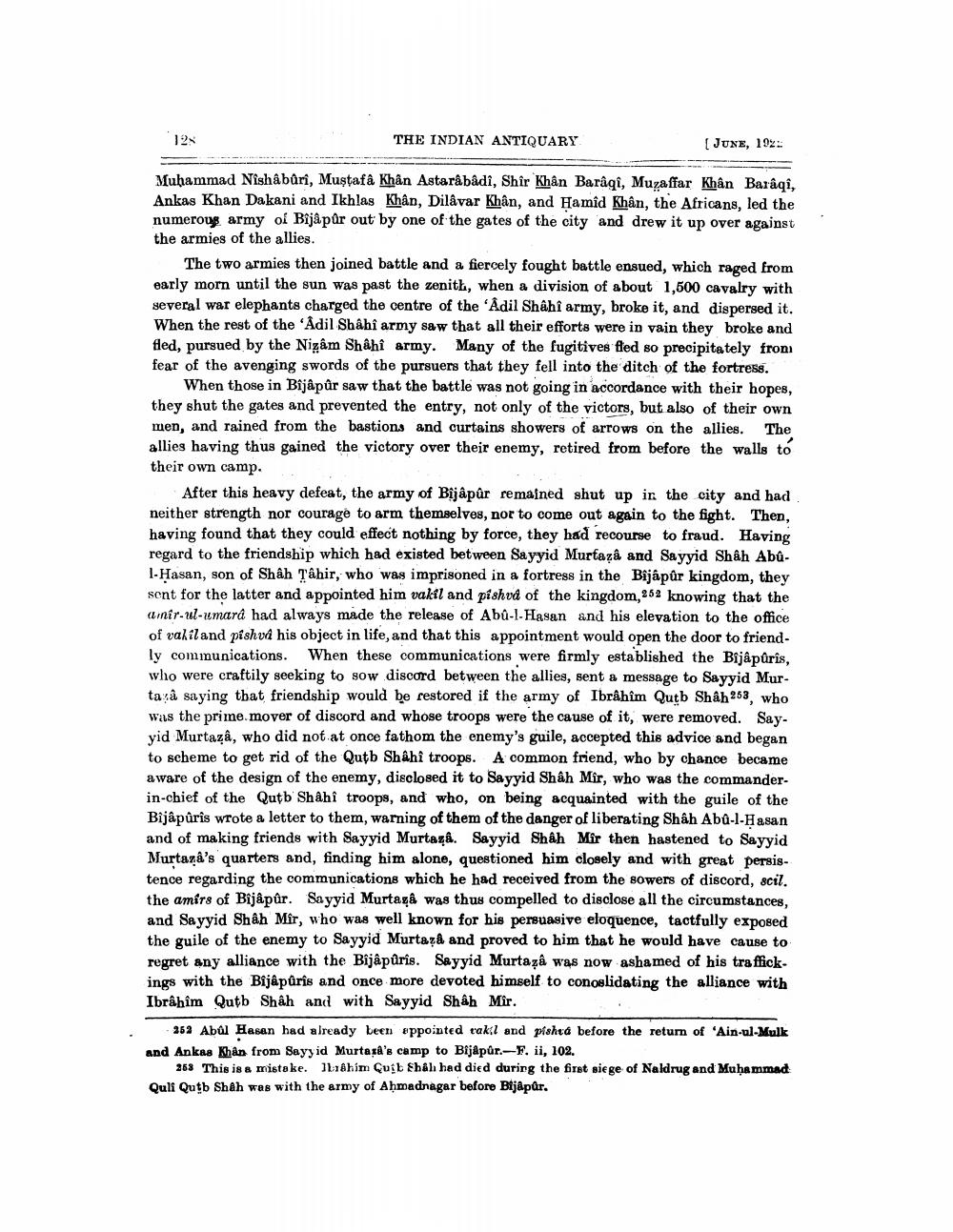________________
123
THE INDIAN ANTIQUARY
(JUNE, 192
Muhammad Nishâbûri, Mustafa Khân Astarâbâdî, Shîr Khân Barâqi, Muzaffar Khân Barâqi, Ankas Khan Dakani and Ikhlas Khân, Dilâvar Khân, and Hamid Khân, the Africans, led the numerous army of Bijapur out by one of the gates of the city and drew it up over against the armies of the allies.
The two armies then joined battle and a fiercely fought battle ensued, which raged from early morn until the sun was past the zenith, when a division of about 1,500 cavalry with several war elephants charged the centre of the 'Adil Shâhi army, broke it, and dispersed it. When the rest of the 'Adil Shâhî army saw that all their efforts were in vain they broke and fled, pursued by the Nizâm Shâhî army. Many of the fugitives fled so precipitately from fear of the avenging swords of the pursuers that they fell into the ditch of the fortress.
When those in Bijâpûr saw that the battle was not going in accordance with their hopes, they shut the gates and prevented the entry, not only of the victors, but also of their own men, and rained from the bastions and curtains showers of arrows on the allies. The allies having thus gained the victory over their enemy, retired from before the walls to their own camp.
After this heavy defeat, the army of Bijapur remained shut up in the city and had neither strength nor courage to arm themselves, nor to come out again to the fight. Then, having found that they could effect nothing by force, they had recourse to fraud. Having regard to the friendship which had existed between Sayyid Murtaza and Sayyid Shah Abul-Hasan, son of Shâh Tâhir, who was imprisoned in a fortress in the Bijapur kingdom, they sent for the latter and appointed him vakil and pishvd of the kingdom, 252 knowing that the amir-ul-umard had always made the release of Abd-l-Hasan and his elevation to the office of valiland pishvd his object in life, and that this appointment would open the door to friendly communications. When these communications were firmly established the Bijâpüris, who were craftily seeking to sow discord between the allies, sent a message to Sayyid Murtaxå saying that friendship would be restored if the army of Ibrâhîm Qutb Shah 263, who was the prime mover of discord and whose troops were the cause of it, were removed. Sayyid Murtaza, who did not at once fathom the enemy's guile, accepted this advice and began to scheme to get rid of the Qutb Shâhi troops. A common friend, who by chance became aware of the design of the enemy, disclosed it to Sayyid Shah Mir, who was the commanderin-chief of the Qutb Shahi troops, and who, on being acquainted with the guile of the Bijâpûris wrote a letter to them, warning of them of the danger of liberating Shah Abd-l-Hasan and of making friends with Sayyid Murtaza. Sayyid Shah Mir then hastened to Sayyid Murtaza's quarters and, finding him alone, questioned him closely and with great persistence regarding the communications which he had received from the sowers of discord, scil. the amirs of Bijâpûr. Sayyid Murtaza was thus compelled to disclose all the circumstances, and Sayyid Shah Mir, who was well known for his persuasive eloquence, tactfully exposed the guile of the enemy to Sayyid Murtaza and proved to him that he would have cause to regret any alliance with the Bijâpäris. Sayyid Murtaza was now ashamed of his traffick ings with the Bijapuris and once more devoted himself to conoslidating the alliance with Ibrahim Qutb Shah and with Sayyid Shah Mir.
352 Abul Hasan had already been sppointed rakl and pishta before the return of 'Ain-ul-Mulk and Ankas Khan from Sayyid Murtazi's camp to Bijapur.-F. ii, 102.
263 This is a mistake. ldhim Quit Ehål had died during the first siege of Naldrug and Muhammad Quli Qutb Shôh was with the army of Ahmadnagar before Bijapur.




